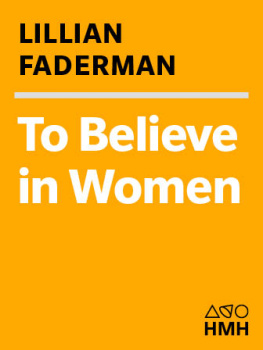Living Difference:
Lesbian Perspectives
on Work and Family Life
Gillian A. Dunne, PhD
Editor
Living "Difference": Lesbian Perspectives on Work and Family Life, edited by Gillian A. Dunne, was simultaneously issued by The Haworth Press, Inc., under the same title, as a special issue of the Journal of Lesbian Studies, Volume 2, Number 4, 1998, Esther D. Rothblum, Editor.
First published 1998 by
The Howorth Press, Inc.
Published 2013 by Routledge
2 Park Square, Milton Park, Abingdon, Oxon OX14 4RN
711 Third Avenue, New York, NY 10017 USA
Routledge is an imprint of the Taylor & Francis Group, an informa business
ISBN 1-56023-115-7
Living Difference: Lesbian Perspectives on Work and Family Life has been co-published simultaneously as Journal of Lesbian Studies , Volume 2, Number 4 1998.
1998 by Taylor & Francis. All rights reserved. No part of this work may be reproduced or utilized in any form or by any means, electronic or mechanical, including photocopying, microfilm and recording, or by any information storage and retrieval system, without permission in writing from the publisher.
The development, preparation, and publication of this work has been undertaken with great care. However, the publisher, employees, editors, and agents of The Haworth Press and all imprints of The Haworth Press, Inc., including The Haworth Medical Press and Pharmaceutical Products Press, are not responsible for any errors contained herein or for consequences that may ensue from use of materials or information contained in this work. Opinions expressed by the author(s) are not necessarily those of The Haworth Press, Inc.
Library of Congress Cataloging-in-Publication Data
Living difference: lesbian perspectives on work and family life / Gillian A. Dunne, editor.
p. cm.
Co-published simultaneously as Journal of lesbian studies, Volume 2, Number 4, 1998.
Includes bibliographical references (p. ) and index.
ISBN 0-7890-0537-9 (alk. paper). - ISBN 1-56023-115-7 (alk. paper)
1. Lesbian mothers. 2. Gay parents. I. Dunne, Gillian A. II. Journal of lesbian studies, v. 2, no. 4.
HQ75.53.L58 1998
306.874'3'086643-dc21
98-38652
CIP
About the Editor
Gillian A. Dunne, PhD, is a Senior Research Fellow at The Gender Institute of The London School of Economics and a former Senior Research Associate in the Faculty of Social and Political Sciences at Cambridge University. Her research interests focus on key feminist and sociological issues through the experiences of lesbian women. For the past three years, Dr. Dunne has been researching lesbian couples with dependent children. She is currently studying the different dimensions of gay fatherhood. In addition, Dr. Dunne is the author of the book Lesbian Lifestyles: Women's Work and the Politics of Sexuality (1997).
Gillian A. Dunne
The author is extremely grateful to the following for their encouragement, friendship and insightful comments: Shirley Prendergast, Ginny Morrow, Andrea Doucet, Wendy Bottero. The project on lesbian parents was made possible through a grant from the Economic and Social Research Council (reference R00023 4649). She would also like to thank her co-applicants-Henrietta Moore and Bob Blackburn, and those poorly paid but highly valued others who have assisted her on the project-Kim Perrin, Esther Dermott and Jackie Beer.
Such has been the impact of feminism on intellectual thought over the past twenty years that it would be a brave and foolhardy social scientist who could discuss the organization of work and family life, without reference to gender. The addition of gender into the analysis, while a source of irritation for more conventional thinkers in the past, can now be acknowledged as generating better understandings of change and continuity in the home and in the workplace.
There remains, however, a further intellectual blind spot in dominant accounts. This has been sustained by a lack of curiosity about the impact of sexual identity on people's experience of work and family life. Mainstream feminist thinking about the limitations and possibilities for transformation in the gender order is informed by empirical research which perpetuates an assumption that workers, parents, and households are heterosexual. Just as the tendency to conflate the category 'worker' with 'man' distorted and obscured understanding, this heterosexual framework limits our capacity to identify obstacles to the creation of a more egalitarian relationship between the sexes. For example, it conceals the significance of heterosexuality itself for shaping the lifechances of women and men. I argue that non-heterosexual experience provides important comparative reference points which can tell us as much about heterosexuality, gender, gender relations, and the mainstream as they do about anything else.
The contributions in this volume upset conventional understandings of work and family life by challenging many of the implicit assumptions that have anchored previous research. The issues explored in each essay demonstrate the need to bring the study of lesbian experience from the margins to the centre of feminist enquiry. In this introduction I shall briefly illustrate why better accounts can be produced by adding sexuality and stirring by focusing on two research projects that I have conducted. My conceptual framework in this respect is informed by four key feminist theoretical insights:
- Sexuality, like gender, is a social construction. The diversity of emotional and sexual expression across time and space flies in the face of beliefs that take sexuality as some innate natural expression (see Faderman 1985, Ortner and Whitehead 1981, Rubin 1975).
- There is a powerful relationship between gender and sexuality in contemporary Western societies. For example, the categories lesbian and heterosexual are dependent on the social production of gender difference (Butler 1990, Connell 1987, Rubin 1975). I argue that cultural understandings of sexuality will influence what we can achieve and how we experience ourselves as women and men, as well as how we relate across gender boundaries.
- That heterosexuality is a social institution that is central to the reproduction of patriarchy (Rich 1984). Its significance in supporting the status quo by providing the logic that draws men and women into relations of inequality gives it an institutional quality. This insight enables us to move beyond the more divisive focus on individual practice to one that is a more critical of social and ideological processes which police the boundaries of heterosexuality.
- The critique of the separate nature of the public and private spheres (Pateman 1988). This, for example, illuminates the relationship between the organization of homelife and paid work opportunities.





